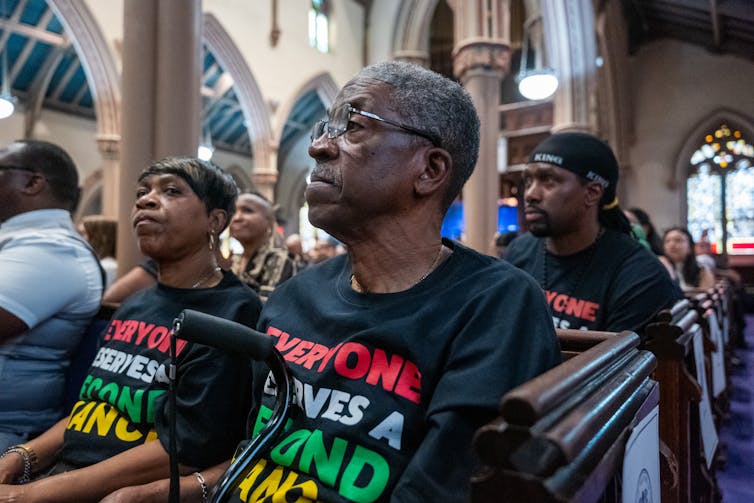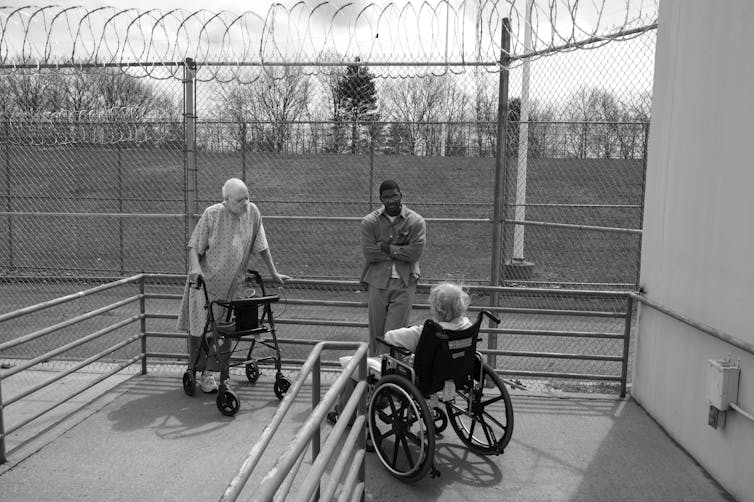America’s prisons are aging rapidly.
After decades of mass incarceration, coupled with America's war on drugs, the proportion of older people in prisons has been increasing since the early 1990s. Nearly a quarter of inmates in federal and state prisons are over 50 years old. This is five times the prison population ratio in 1991.
More than 95 percent of incarcerated people will eventually be released from prison, either on parole or after serving their sentence. And the older they are when they are released, the harder it is to reintegrate into society.
Compared with people under 50, older adults face greater health, housing and family barriers after prison. As a result, they often rely more on parole officers and social service providers to get them settled. Yet our criminology research in New Jersey shows there simply isn’t enough help to meet their needs.
"All my friends are dead"
Older ex-offenders often face significant challenges readjusting to life outside of prison and supporting themselves.

Housing is a top priority. For older parolees, living with family is often not possible. Many cycled in and out of prison for long periods of time, causing tension in their families.
The example of Cosmo, who was 56 years old when he was interviewed for our research in 2021, is illustrative. Cosmo, who has a history of substance abuse and no family in New Jersey, found himself homeless after being released from prison in 2021.
"I was assured that parole would provide me with a place to stay," he said.
But Cosmo said that when he spoke to parole officers, "they told me in no uncertain terms" they couldn't help with the housing issue.
Eventually, a local social services agency found him a room in a motel. He could stay there while finding a job and saving enough money to find more permanent housing.
Daniel, a 74-year-old Vietnam veteran we interviewed, has been imprisoned for seven years. During this time his wife died. Most of his friends are gone too.
"All my friends have died except one," Daniel said in 2021, saying the two had known each other for 69 years. "Best friends," he added. "We met in kindergarten."
However, his friends were unable to help Daniel because he was hospitalized and his health was deteriorating.
Daniel is alone in New Jersey, relying on a reentry counselor he met through church to meet his needs. She set him up for Medicare and Medicaid and a senior transportation card.
"You have to educate an 80-year-old man"
The hardships of prison often lead to accelerated aging. Research shows that incarcerated people age 50 or older are more likely to have chronic health problems or disabilities than other non-incarcerated people of the same age. That's why prisons often designate inmates who are 50 or 55 years old as "elderly" inmates.
Decreasing physical and mental health problems among older parolees add to the already bleak employment prospects of those with criminal records. Long sentences can also create huge gaps in their work history and all but ensure that the skills they cite in their applications are limited and often outdated.
All of this makes it difficult for older people released from prison to support themselves.
"You've been in prison for 30 years, and you don't have the conventional skills you're supposed to have," an executive at a community services provider in New Jersey told us during a 2024 focus group. "You're not reading...other educational stuff. Then you have no life skills."
"So, yes," she concluded, "you have to educate an 80-year-old man and teach him how to read."
Old people start from scratch
There are no specialized agencies or organizations in the United States dedicated to supporting the reintegration process of older parolees. They must navigate a complex landscape of government services, nonprofits, and private companies.
Older parolees often rely on the parole system to connect them with housing and social services and provide general guidance. Often, parole officers even teach their elderly clients digital literacy so they can submit job applications and receive social service benefits online.
Public and nonprofit social service agencies can help formerly incarcerated people apply for government benefits such as Medicaid or Social Security and find housing. Nationwide, county health and human services departments provide housing assistance, meal delivery services and other social assistance to all residents in need, regardless of criminal record.
Hundreds of nonprofit organizations provide job training, reentry support, substance abuse counseling and other services.
Daniel and Cosmo got the help they needed to start their lives over in New Jersey.
But are these support systems strong enough to support the state’s growing, aging parole population? In New Jersey, 22 percent of prison inmates are 50 or older, up from 13 percent a decade ago.

To answer this question, we surveyed more than 400 organizations in New Jersey in 2024 and conducted focus groups with those serving the state’s formerly incarcerated older population.
While nonprofits in New York, California, and other states have developed initiatives specifically to provide housing and support for older adults leaving prison, we found no such programs in New Jersey.
However, our research identified a range of community groups with the ability to help formerly incarcerated people aged 55 or older.
Hundreds of organizations work on senior services and support for formerly incarcerated people, and two-thirds of organizations told us they are interested in partnering with parole groups and other community organizations to support older adults leaving prison. About half expressed a willingness to host proven interventions for this population, such as peer-based support groups.
Such groups are rare in the United States because parole limits contact between people with criminal records. But talking to others who have experienced similar issues after release can provide comfort and encouragement to parolees with limited social support—which is especially urgent for those over 65.
help Wanted
As the U.S. prison population ages, more and more older adults will be returning to communities across the country. They are less likely to reoffend after being released from prison. But they need more help to get back on their feet.
Ronnie, 59, found help in 2021 at the New Jersey office of the Community Resource Center (CRC). This national network provides reentry support through group programming to address substance abuse issues, thinking and judgment errors, and many other problematic procedures.
“My main concern is housing — where I’m going to live and how I’m going to support myself in terms of work,” Ronnie said.
He had been approved for $825 a month in Social Security benefits, but it wasn't enough.
"The rent is $700. So if my salary is $825 and I'm paying $700 in rent, I can't survive on $125 a month," Ronnie said.
His CRC social worker is working to get him into a nursing home that is much more affordable.
"$200 or $300, I can handle that," Ronnie said, "no problem."